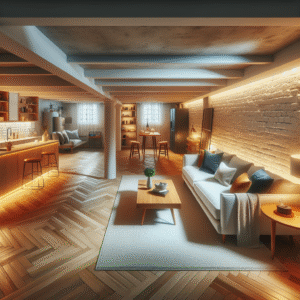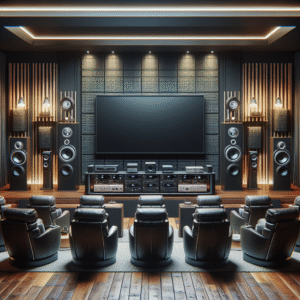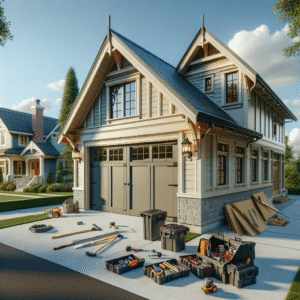If you’re in the market for a new HVAC system or simply looking to understand your current one better, navigating the maze of options can be daunting. HVAC systems—not just a utility but a cornerstone for home comfort—are available in various types to suit different needs and preferences. Understanding the nuances of each type and their benefits is key to making an informed decision that ensures comfort year-round. In this article, we’ll dive deep into the different types of HVAC systems, key factors to consider before making a purchase, and a comparison of the top brands to help you make the best choice for your home.
Understanding HVAC System Types and Their Benefits
Heating, Ventilation, and Air Conditioning (HVAC) systems are essential in maintaining a comfortable and healthy environment in your home. Each type of system offers unique benefits:
- Central Air Conditioners: Efficiently cool large homes evenly.
- Heat Pumps: Provide both heating and cooling, making them ideal for climates with moderate heating and cooling needs.
- Furnaces: Popular in cold regions for their heating efficiency.
- Boilers: Excellent for homes needing efficient radiating heat without ductwork.
- Mini-Split Systems: Perfect for heating and cooling individual rooms without the need for ducts.
Key Factors to Consider When Choosing an HVAC System
Choosing the right HVAC system involves more than just picking a brand. Consider these crucial factors:
- Home Size and Layout: Determines the type and capacity of the system needed.
- Climate: Influences whether you need a more robust heating or cooling focused system.
- Energy Efficiency: Higher efficiency ratings can mean lower utility bills and environmental impact.
- Budget: Factor in both the initial investment and long-term operating costs.
- Existing Ductwork: Existing infrastructure can influence the choice between ducted and ductless systems.
Top 5 HVAC Brands and Their Comparative Advantages for Home Use
When it comes to selecting a brand, the market offers several reputable options. Here’s a brief overview of the top 5 HVAC brands:
- Carrier: Known for high efficiency and reliability.
- Trane: Offers durable units and top-tier performance.
- Lennox: Features the most advanced technology with impressive energy efficiency.
- Goodman: Great value for money with decent performance.
- Rheem: Excellent warranty and customer service support.
In the following sections, we will delve deeper into each brand’s specific models and features to help you find the perfect fit for your home’s unique needs. Stay tuned for more expert advice that’s just as warm—or cool—as your perfectly temperature-controlled home!

If you’re ready to take your home improvement or construction project to the next level, we can help! Find trusted contractors on BuildNet, whether you’re looking for renovations, new builds, electrical work, plumbing, or anything in between. Our directory connects you with qualified professionals who can make your vision a reality.
Understanding HVAC System Types and Their Benefits
Hey there! If you’re diving into the world of home comfort, you’ll likely encounter the term HVAC, which stands for Heating, Ventilation, and Air Conditioning. These systems are crucial in maintaining a comfortable and healthy environment in your home, no matter the season. Let’s walk through the different types of HVAC systems and discuss the benefits each type brings to the table. Whether you’re building a new home or upgrading your current system, this information will help you make an informed decision.
1. Central Air Conditioners and Heating
Central air conditioners and heating systems are among the most common HVAC systems found in homes. They work by circulating cool or heated air through ducts and vents installed throughout your home.
- Benefits: Central systems are great for maintaining a consistent temperature across multiple rooms. They come with filters that improve indoor air quality by trapping dust, pollen, and other allergens.
2. Ductless Mini-Split Systems
Ductless mini-split systems are ideal for homes without ductwork. They consist of an outdoor compressor unit and one or more indoor air handling units, connected by a small conduit.
- Benefits: These systems offer flexibility for heating and cooling specific rooms or zones. They are energy-efficient and easy to install, making them a favorite for room additions or smaller living spaces.
3. Heat Pumps
Heat pumps are versatile systems that can both heat and cool your home. They work by transferring heat from one place to another, depending on the season.
- Benefits: Heat pumps are energy-efficient, particularly in mild climates. They provide a sustainable alternative to furnaces and air conditioners and can significantly reduce utility bills.
4. Furnaces
Furnaces are a traditional heating solution that uses a fuel source like gas, oil, or electricity to heat air, which is then blown through the ductwork by fans.
- Benefits: They are reliable and fast at heating up a space. Modern furnaces are also designed with efficiency in mind, potentially lowering heating costs.
5. Boilers
Boilers heat water, providing either hot water or steam for heating. Steam is distributed via pipes to steam radiators, while hot water can be distributed via baseboard radiators or radiant floor systems.
- Benefits: Boilers provide comfortable, even heat that doesn’t produce drafts or dry out the air within your home.
6. Geothermal Heating and Cooling Systems
Geothermal systems use the earth’s stable underground temperature to provide heating and cooling. They involve installing a series of pipes, known as a loop, underground near your home.
- Benefits: These systems are highly efficient and environmentally friendly. While the initial installation might be costly, the long-term energy savings and minimal maintenance can make them a worthwhile investment.
7. Hybrid Systems
Hybrid systems combine a gas furnace with an electric heat pump. These systems intelligently switch between the two energy sources, depending on which is most cost-effective at the time.
- Benefits: Flexibility and efficiency are the hallmarks of hybrid systems. They are particularly effective in regions where electricity prices fluctuate seasonally.
Choosing the Right HVAC System for Your Home
Now that you’re familiar with the types of HVAC systems, how do you choose the right one for your home? The answer depends on several factors including your local climate, the size of your home, and your energy efficiency needs. Consulting with a local HVAC professional can help tailor the choice to your specific conditions, ensuring optimal comfort and efficiency.
Whether you’re interested in a cost-effective furnace, an environmentally friendly geothermal system, or a flexible hybrid system, each type of HVAC system has distinct benefits that can enhance the comfort and quality of life in your home. Remember, investing in a suitable HVAC system not only provides comfort but also increases the value of your property.
By understanding the different types of systems and their benefits, you’re well on your way to making an informed decision that will keep your home cozy for years to come. So, get ready to take control of your home’s climate and enjoy the comfort you deserve!

Key Factors to Consider When Choosing an HVAC System
Hey there, homeowner! Are you in the market for a new HVAC system but feeling overwhelmed by the choices? You’re not alone. Picking the right HVAC system for your home is a crucial decision, and it’s important to go into this with all the facts. So, grab a cup of coffee, and let’s walk through the key factors you need to consider before making your purchase!
1. The Size of Your Home
Size really does matter when it comes to HVAC systems. A system that’s too large will cycle on and off too frequently, leading to increased wear and tear. On the other hand, a system that’s too small won’t be able to effectively heat or cool your entire home. To find the perfect fit, you might need to consult with a professional who can perform a load calculation based on your home’s layout, insulation levels, window types, and more. This step is crucial, not just for comfort, but also for maximizing energy efficiency.
2. Energy Efficiency
Speaking of efficiency, who doesn’t want to save money on their energy bills? When shopping for an HVAC system, look for the Seasonal Energy Efficiency Ratio (SEER) for cooling units and the Annual Fuel Utilization Efficiency (AFUE) for heating units. The higher the SEER or AFUE rating, the more efficient the unit. Though high-efficiency models might be more expensive upfront, they can significantly lower your monthly bills, making them a wise investment in the long run.
3. Type of System
Do you want a central system that heats and cools through ductwork, or are you considering something less invasive like a ductless mini-split system? Each type has its pros and cons. Central HVAC is great for heating and cooling large spaces evenly, but it can be costly if you need to install or repair ductwork. Ductless systems are more flexible and easier to install, particularly in homes without existing ductwork, but they might be more visible and can require multiple units to cover the whole house.
4. Indoor Air Quality Features
Your HVAC system plays a significant role in indoor air quality. Consider units with built-in air purifiers, humidifiers, and dehumidifiers. These features can immensely improve the comfort and healthiness of your home environment, especially if you live in areas with extreme weather conditions or if someone in your household has allergies or asthma.
5. Maintenance and Upkeep
Before you commit to a new HVAC system, think about the long-term. Some systems require more maintenance than others. Inquire about the ease of accessing filters for routine cleaning, the frequency of professional maintenance needed, and if your local HVAC service providers are familiar with the brand and model you are considering. This can prevent headaches down the line.
6. Local Climate
The climate in which you live should heavily influence your decision on which HVAC system to install. For example, if you’re in a particularly hot and humid region, you’ll want a robust air conditioning system that can handle the moisture effectively. Homes in cooler climates might benefit more from systems that focus on efficient heating technologies. Tailoring your choice to your local climate will ensure optimal performance.
7. Future-Proofing and Smart Features
Technology is constantly evolving, and HVAC systems are no exception. More homeowners are choosing systems that integrate with smart home technologies. These systems offer features like remote temperature control via smartphones, learning thermostats that adjust automatically, and more. While these features might seem like luxuries now, they can provide significant savings and conveniences in the future.
8. Budget and Incentives
Finally, let’s talk budget. It’s important to consider not only the initial cost of the HVAC system but also the potential savings in energy bills and maintenance. Additionally, check for local or federal tax credits and rebates available for energy-efficient models. These incentives can help offset the upfront cost and make a high-quality, efficient system more affordable.
Choosing the right HVAC system for your home doesn’t have to be daunting. By considering these factors, you can make an informed decision that balances comfort, cost, and efficiency. Remember, this is an investment in your home’s future and your family’s comfort. A little research and planning now can lead to a lot of saved money and hassle down the road.
Top 5 HVAC Brands and Their Comparative Advantages for Home Use
Welcome to our cozy corner of the internet, where we talk all things HVAC for your home! If you’re contemplating a new HVAC system, you’ve probably realized that the choices are many and the decisions are big. Today, let’s walk through the top 5 HVAC brands, dive into what makes each unique, and figure out which might be the best fit for your cozy abode.
1. Trane
Often celebrated for its reliability and efficiency, Trane is a heavyweight in the HVAC industry. Known for systems that withstand the test of time, Trane offers a variety of options that cater to different needs and budgets. Whether you’re looking for something economical or a top-tier system with all the bells and whistles, Trane probably has it.
- Advantages: Durability, extensive warranty options, and energy-efficient models.
- Best for: Homeowners looking for a dependable, long-term solution.
2. Carrier
With a solid reputation for air quality solutions, Carrier stands out as a pioneer in the industry. Their emphasis on eco-friendly and energy-efficient products not only helps reduce your carbon footprint but also aids in managing household energy expenses.
- Advantages: High energy efficiency ratings, cutting-edge technology, great for allergy sufferers due to superior air filtration features.
- Best for: Environmentally conscious consumers wanting to maintain a clean, healthy indoor atmosphere.
3. Goodman
If you’re budget-conscious but don’t want to compromise on quality, Goodman might be your match. Offering competitive pricing without skimping on durability, Goodman provides a solid warranty that reassures value for money.
- Advantages: Affordable prices, reliable performance, good warranty conditions.
- Best for: Homeowners who want a balance of price and quality.
4. Rheem
Rheem is well-regarded for its innovation and versatility in products that cater to both residential and commercial markets. Their offerings include highly efficient heating and cooling solutions that adapt well to different climates and home sizes.
- Advantages: Wide product range, excellent energy efficiency, innovative features like modulating operation for enhanced comfort.
- Best for: Those looking for customizable solutions in diverse climates.
5. Lennox
At the forefront of home comfort, Lennox stands out for its high-efficiency HVAC systems. Known for some of the highest SEER ratings (Seasonal Energy Efficiency Ratio) available, Lennox is a great choice if you’re particularly concerned about lowering energy usage and utility bills.
- Advantages: Superior energy efficiency, quiet operation, and advanced features like precise temperature controls.
- Best for: Energy-conscious homeowners looking to invest in cutting-edge technology and reduce environmental impact.
Choosing the right HVAC system can greatly influence your home’s comfort and your wallet. Each of these brands offers unique benefits that cater to diverse needs and preferences. Whether you value cutting-edge technology, energy efficiency, or reliability, there’s an option out there that’s perfect for keeping your home comfortable year-round.
Remember, selecting an HVAC system isn’t just about the brand; it’s also about ensuring proper installation and maintenance. Partnering with a professional from a reputable local service like BuildNet can ensure that your system is set up perfectly for your home’s specific needs.
So now that you’re equipped with this information, why not give your local HVAC contractor a call? If you’ve already got a brand in mind, they can help you navigate the next steps. Or, if you’re still on the fence, they can provide additional insights to help you make the best choice for your home. Happy heating and cooling!

What Are the Different Types of HVAC Systems Available?
When choosing an HVAC system for your home, you have several types to consider, each with its unique benefits:
- Split Systems: These are the most common residential HVAC systems, consisting of one unit outside (handling air conditioning) and one unit inside (for heating).
- Hybrid Systems: Similar to split systems but with the added advantage of energy efficiency, as they can switch between gas power, which is faster and more powerful, and electric, which is more efficient and quieter.
- Ductless Mini-Splits: Ideal for homes without ductwork, these systems provide direct air into different zones or rooms, offering improved control over the temperature in individual spaces.
- Packaged Heating & Air Conditioning Systems: These units combine a compressor, condenser, and evaporator all in one unit, typically installed on the roof or near the foundation. They are a good solution for homes with limited space for a split system.
What Should I Consider When Choosing an HVAC System?
Selecting the right HVAC system involves several factors that can affect your home’s comfort and your wallet:
- Size of Your Home: The size and layout of your home determine the capacity of the HVAC system needed.
- Energy Efficiency: Systems with higher SEER (Seasonal Energy Efficiency Ratio) ratings may cost more upfront but typically lead to lower utility bills.
- Air Quality Needs: Consider options like HEPA filters or built-in humidifiers if you have allergies or live in a dry climate.
- Budget: Balance upfront costs with long-term savings through energy-efficient systems or potential rebates.
What Are the Top 5 HVAC Brands and Their Comparative Advantages?
When it comes to reliable HVAC brands suited for home use, here are the top 5 known for their quality and performance:
- Carrier: Known for high efficiency and advanced technology in climate control.
- Trane: Offers durable units that are tested under extreme conditions.
- Lennox: Focuses on energy-efficient solutions and innovative features.
- Goodman: Known for affordability and good warranty terms.
- Rheem: Offers a wide range of HVAC products tailored to various budgets and needs.
How Do I Maintain My HVAC System?
Maintaining your HVAC system is crucial for prolonging its life and maintaining efficiency:
- Regularly Replace Filters: Change air filters every 30-90 days to keep air flowing efficiently.
- Schedule Annual Maintenance: Have a professional check your system at least once a year.
- Keep Units Clear: Ensure that both indoor and outdoor units are free from debris and dust.
How Can I Save Energy with My HVAC System?
To optimize your HVAC system for energy efficiency, consider the following tips:
- Programmable Thermostat: Install one to reduce heating and cooling in unoccupied hours.
- Seal Ductwork: Ensure that ducts are sealed and insulated to prevent energy loss.
- Upgrade to Energy-Efficient Systems: Consider newer, more efficient models if your system is old and less efficient.
Conclusion
Now that you’re equipped with this knowledge about HVAC systems, you’re closer to making an informed decision about the best system for your home. Remember, choosing the right HVAC system involves considering the size of your home, your air quality needs, energy efficiency, and your budget. With top brands like Carrier, Trane, and Lennox, you can expect a combination of durability, efficiency, and advanced technology.
If you’re contemplating a new HVAC system or need maintenance on your current one, why not contact a professional for a free quote? At BuildNet, our network of seasoned contractors is ready to provide top-notch service tailored to your needs. Don’t hesitate to reach out to a contractor via the BuildNet website today to ensure your home stays comfortable year-round!







